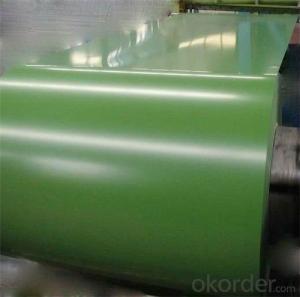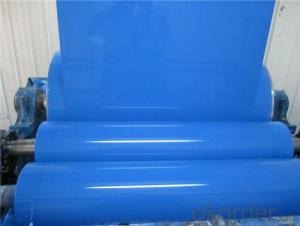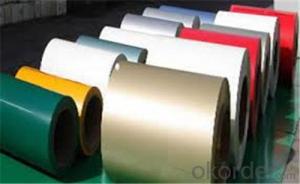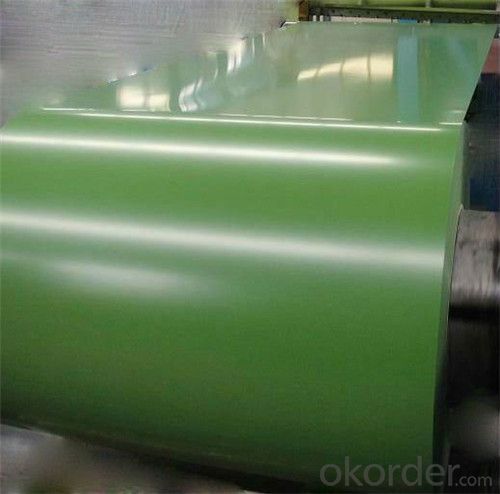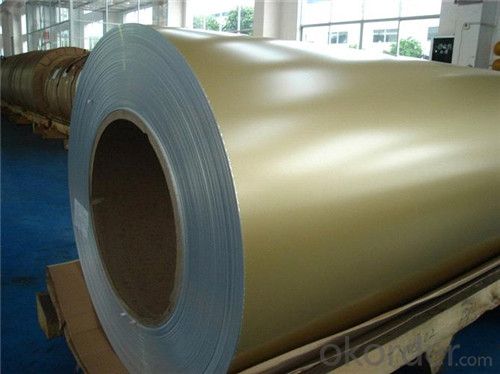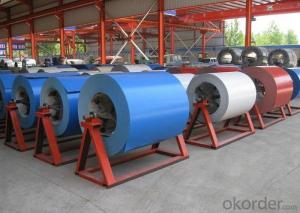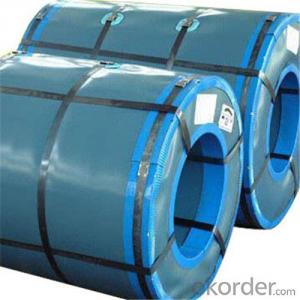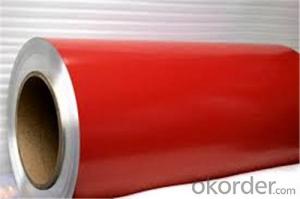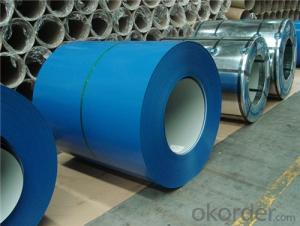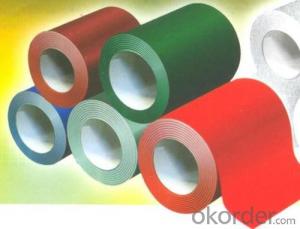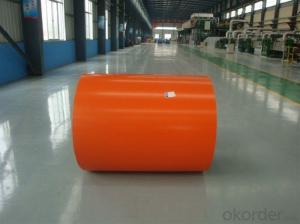prepainted rolled Steel Coil for construction Roofing Constrution
- Loading Port:
- Shanghai
- Payment Terms:
- TT OR LC
- Min Order Qty:
- 50 m.t.
- Supply Capability:
- 30000 m.t./month
OKorder Service Pledge
OKorder Financial Service
You Might Also Like
Structure of Prepainted Rolled steel Coil for Construction Roofing
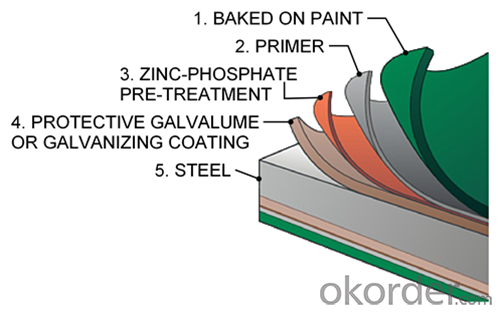
Description of Prepainted Rolled steel Coil for Construction Roofing
Prepainted Rolled steel Coil is a kind of coated steel coil/sheet. With the cold rolled steel of different strength and thickness as substrate, it is produced through applying Al-Zn coat on both faces by hot dip process. In its coating, Al accounts for about 55%, Si 1.6%, while the remaining is Zn. Aluminum zinc coils enjoys both the physical protective feature and durability of Al and the electrochemical protective property of Zn. And its surface has bright silver color and regular embossed-like figure, which are highly decorative.
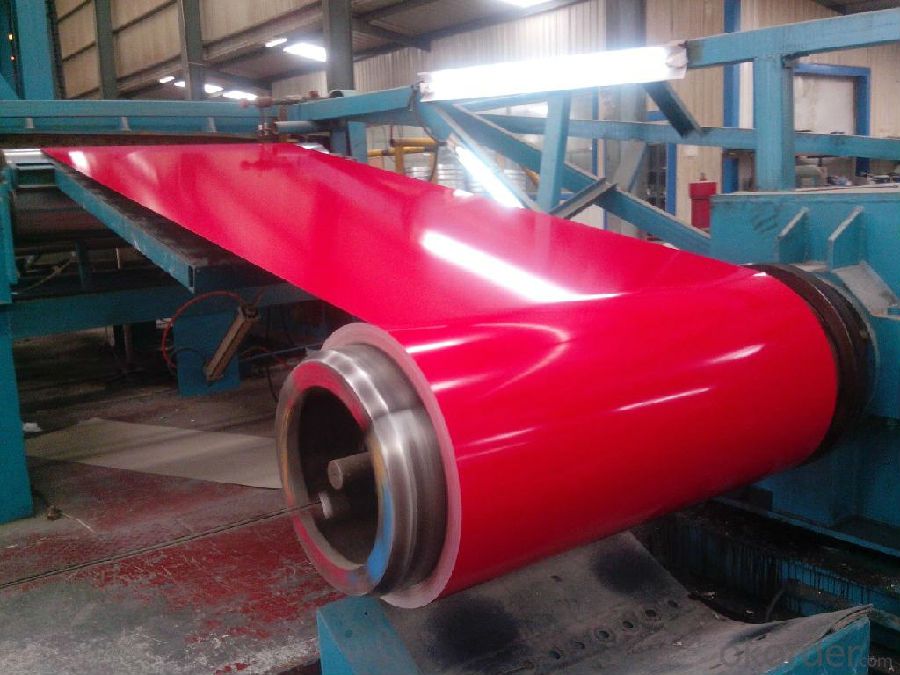
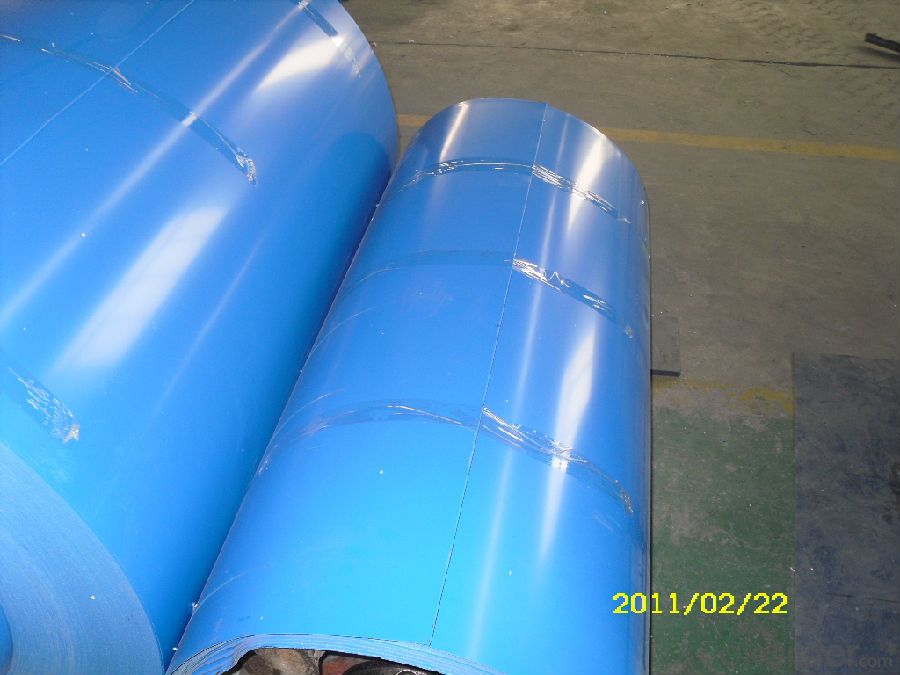
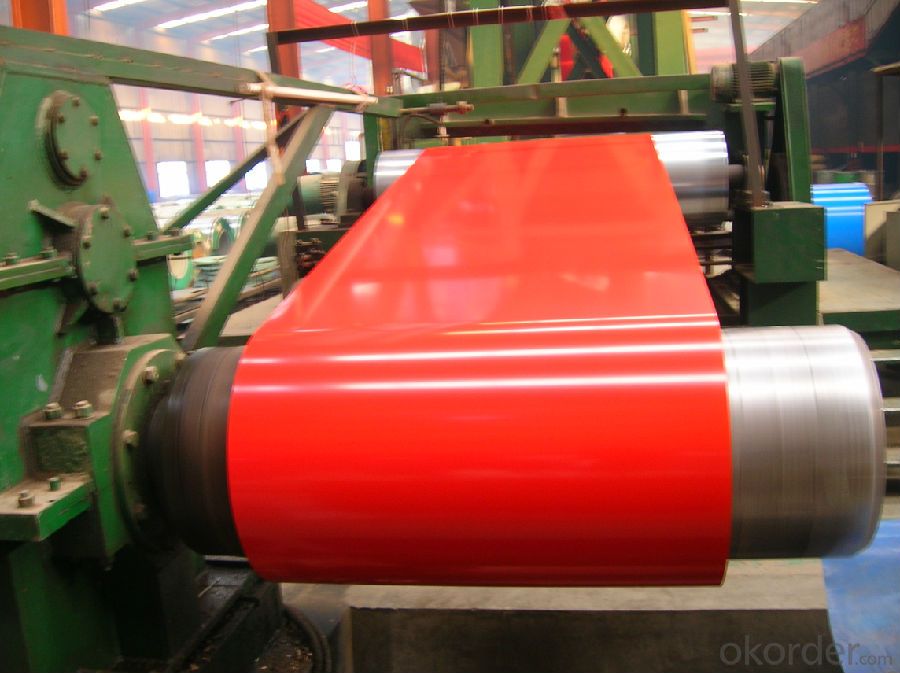
Main Feature of Prepainted Rolled steel Coil for Construction Roofing
1.Corrosion resistance: It mainly depends on the aluminum protection. When the zinc being worn, the aluminum will form a dense layer of aluminum oxide, resist corrosion material to prevent further corrosion inside.
2. Heat resistance: Aluminum zinc alloy steel sheet has excellent heat resistance, can withstand high temperatures over 300 centigrade, and is similar with aluminized steel high temperature oxidation resistance. It often used in chimney pipes, ovens, fluorescent lighting device and the device cover.
3. Heat reflective: Galvanized steel plate heat-reflective high rate is twice as galvanized steel, often used to make insulation materials.
4. Economy: Because density of 55% AL-Zn is smaller than the density of Zn, so in the same weight and thickness of Galvanized zinc layer, aluminum-zinc steel plate is larger area more than 3% of galvanized steel sheet.
Applications of Prepainted Rolled steel Coil for Construction Roofing
1. Construction and building: roofing; ventilating duct; handrail; partition panel;etc.
2. Electric appliance: refrigerator; washing machine; refrigerator; DVD;etc.
3.Transportation: oil tank; road sign; etc.
4.Agriculture:barn; etc.
5.Others:vending machine; game machine; etc.
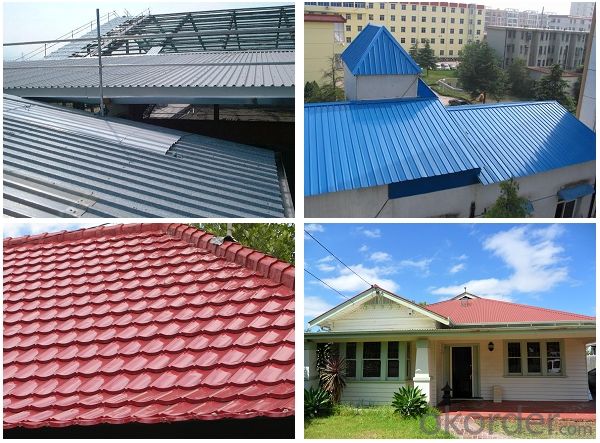
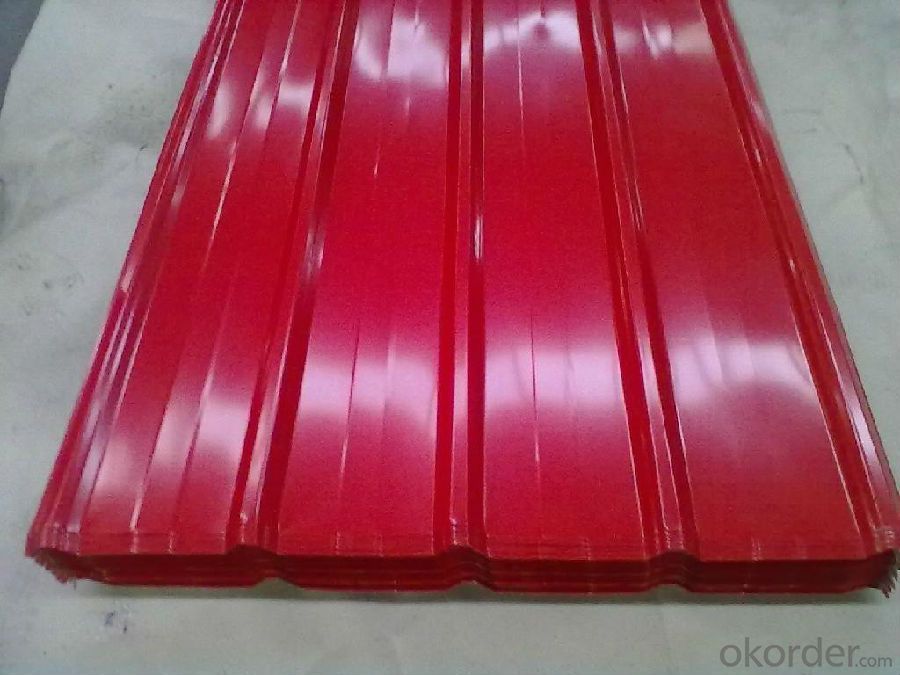
Specifications of Rolled steel Coil for Construction Roofing
Product | Prepainted Rolled steel Coil for Construction Roofing |
Material Grade | SGCC / SGCH / DX51D+AZ, etc |
Thickness | 0.2-3.0mm |
Width | 600-1500mm |
Tolerance | Thickness: +/-0.02mm , Width:+/-2mm |
Zinc-coating | AZ40-150g/m2 |
Technique | Raw material: Hot rolled steel coil --> Cold rolled_>hot dipped galvalume |
Surface | Dried, Chromated, Unoiled |
Spangle | Regular spangle , small spangle, zero spangle |
ID | 508MM |
Coil weight | 10MT max |
Export package | Cardboard inner sleeves, Waterproof paper, galvanized steel covered and steel strip packed |
FAQ of Prepainted Rolled steel Coil for Construction Roofing
We have organized several common questions for our clients,may help you sincerely:
1. What is the minimum order quantity ?
Our MOQ is 50mt for each size. And we will consider to give more discount if you make big order like 1000 tons and more. Further more, the more appropriate payment term your offer the better price we can provide.
2. How long can we receive the product after purchase?
Usually within thirty working days after receiving buyer’s advance payment or LC. We will arrange the factory manufacturing as soon as possible. The cargo readiness usually takes 15-25 days, but the shipment will depend on the vessel situation.
3. How to guarantee the quality of the products?
We have established the international advanced quality management system,every link from raw material to final product we have strict quality test;We resolutely put an end to unqualified products flowing into the market. At the same time, we will provide necessary follow-up service assurance.
- Q: I looking at replacing a few of the panels on my car with either Carbon Fiber or High Tensile Steel to shave off some weight and increase mpg and take some time off my quarter mile. Which is better: Carbon Fiber or High Tensile Steel?
- Steel is much cheaper to buy, but weighs more than the carbon fiber and is not as strong as a rule. To save weight on a race car go with carbon fiber. To save weight (money) on the wallet go with steel.
- Q: How are steel coils inspected for oil or rust residues?
- Steel coils are typically inspected for oil or rust residues through visual examination, as well as using various testing methods such as wiping the surface with a white cloth to check for any visible stains or residues. Additionally, some inspectors may also use specialized equipment such as ultraviolet lights or moisture detectors to identify any hidden oil or rust contaminants.
- Q: I know of the cheaper steel shot for waterfoul hunting, but there is more expensive shot available. Is it worth the money, how much more distance are we talking, and what do you like the best?(brand name)
- Steel,as you say has a shorter effective range that heavier metals, use at least two shot sizes larger with steel, i.e. if you normally use 6's, use 4's. Also check that your barrels are suitable for steel shot, most old guns are not. The more expensive alternatives are worth the money, although my experience of tin shot was not very impressive. I would recommend bismuth or, the best in my experience, tungsten matrix shot. P.S. All of the alternatives to lead are hard on the teeth!
- Q: I want to know if Diamond is stronger than Steel.
- What Is Stronger Than Diamond
- Q: What are the different types of coatings applied to steel coils?
- There are multiple types of coatings that can be applied to steel coils, including galvanized coatings, which involve applying a layer of zinc to prevent corrosion; organic coatings, such as paints or lacquers, which provide protection and enhance aesthetics; and metallic coatings, like aluminum or tin, which offer corrosion resistance and improved appearance.
- Q: Can steel coils be coated with chemical-resistant materials?
- Yes, steel coils can be coated with chemical-resistant materials. These coatings provide a protective barrier against chemical corrosion and can help extend the lifespan of the steel coils in environments where they may be exposed to corrosive chemicals or substances.
- Q: Are steel coils used in shipbuilding?
- Yes, steel coils are commonly used in shipbuilding. These coils are typically made of high-quality steel and are used in various parts of the ship's structure, such as the hull, decks, and bulkheads. The use of steel coils ensures the strength, durability, and structural integrity of the ship, making it capable of withstanding the harsh marine environment and heavy loads.
- Q: What are the different methods of pickling steel coils?
- There are several methods of pickling steel coils, including acid pickling, electrolytic pickling, and mechanical pickling. Acid pickling involves immersing the coils in a bath of diluted acid, such as sulfuric acid or hydrochloric acid, to remove surface oxides and impurities. Electrolytic pickling uses an electric current to remove the oxide layer from the steel coils, usually in a solution of sulfuric acid. Mechanical pickling involves scrubbing the coils with abrasive materials or using mechanical rollers to remove the scale and impurities. Each method has its own advantages and is chosen based on the specific requirements and conditions of the steel coils.
- Q: How are steel coils inspected for weldability?
- A series of comprehensive tests and examinations are carried out to inspect the weldability of steel coils. The main objective of this inspection is to assess the quality and suitability of the steel coils for welding purposes. To begin with, a visual inspection is conducted to identify any visual defects or irregularities present on the surface of the coils. This includes checking for factors such as surface roughness, cracks, scratches, or any other imperfections that might affect the weldability. Following this, destructive testing methods, such as tensile testing and impact testing, are performed. Tensile testing measures the strength and ductility of the steel, ensuring that it meets the required mechanical properties for welding. Impact testing evaluates the steel's ability to resist brittle fracture, which is crucial in determining its weldability. In addition, non-destructive testing techniques like ultrasonic testing (UT) and magnetic particle inspection (MPI) are employed to detect any internal defects or discontinuities. UT utilizes high-frequency sound waves to identify hidden flaws within the steel, while MPI uses magnetic particles to identify defects on or near the surface. Moreover, chemical analysis is carried out to determine the composition of the steel and ensure that it meets the required specifications for welding. This analysis involves checking the levels of carbon, manganese, sulfur, and other elements that may impact the weldability and overall performance of the steel. Furthermore, weldability testing is performed to evaluate how the steel responds to welding processes. This involves conducting various welding trials using different techniques and parameters to assess the steel's behavior during welding, including its susceptibility to cracking, distortion, or other welding-related issues. In conclusion, the inspection of steel coils for weldability is a comprehensive process that involves visual inspection, destructive testing, non-destructive testing, chemical analysis, and weldability testing. Through these thorough inspections, manufacturers can ensure that the steel coils meet the required standards and are suitable for welding applications.
- Q: How are steel coils used in the manufacturing of construction bulldozers?
- Steel coils are used in the manufacturing of construction bulldozers primarily for their strength and durability. These coils are typically transformed into various components, such as the bulldozer's frame, blade, and tracks, which require robust materials to withstand the heavy-duty tasks and harsh operating conditions. The steel coils are processed and shaped into these parts, ensuring that the bulldozer can effectively push, lift, and carry heavy loads while enduring the rigors of construction sites.
Send your message to us
prepainted rolled Steel Coil for construction Roofing Constrution
- Loading Port:
- Shanghai
- Payment Terms:
- TT OR LC
- Min Order Qty:
- 50 m.t.
- Supply Capability:
- 30000 m.t./month
OKorder Service Pledge
OKorder Financial Service
Similar products
Hot products
Hot Searches
Related keywords
